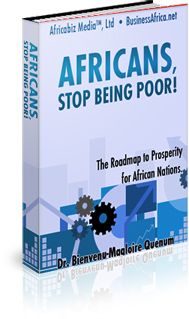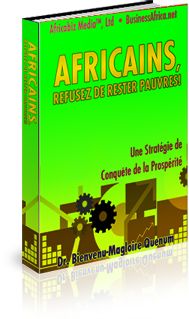|
****JavaScript based drop down DHTML menu generated by NavStudio. (OpenCube Inc. - http://www.opencube.com)****



|
| ! |
| AFRICABIZ
VOL 2 - ISSUE: 114
April 15 - July 14, 2009
Previous
Issue
Editor: Dr. Bienvenu-Magloire Quenum
Click here for contact & support console
| | A
WORD FROM THE EDITOR
| | |
|
Dear visitor and international investor,
We
warmly welcome you, if this is
your first visit to Africabiz
Online - The ultimate newsletter
on trading and investing in 49
sub-Saharan African countries.
If you are a regular and faithful
reader, welcome back.
-
G8 FAILED TO DELIVER. G20 WILL NOT DELIVER - THE ABSOLUTE NEED FOR A SURVIVAL STRATEGY
The evolving world financial crisis forced leaders from developed nations (The United States of America, France, The United Kingdom, Germany, Italy, Russia, Canada, Japan - the so-called G8), and few chosen emerging countries's leaders (China, Brazil, South Africa, India, Etc.;) to meet at London, UK, April 2-3, 2009, to try to define a global solution to a global worldwide crisis.
The end of the meeting had been met with a salvo of enthusiastic reports claiming success - delivered by attending governments' and agencies's representatives and reporters.
For a sober observer, however, the confidence expressed about the outcome of the summit, was obviously an exercise staged to conjure the eventual forthcoming bad omen: social disorder and worldwide chaos. Indeed, people worldwide need to be reassured that the financial crisis would not jam, halt and destroy the whole world economic structure.
However, success or failure, the near future of the few coming months towards the end of year 2009 would tell more, as houses's foreclosures, closing of manufacturing shops, bankruptcies and financial debacles of well established and centenary companies are mounting in Europe and the States. Not to forget the drastic slowdown of the international trading, that is badly hurting Africa exports of soft commodities and minerals.
In the official communiqu�, G8 leaders attending the G20 summit promised more financing to assist poor countries weather the financial debacle, and avoid the looming social and economic disaster. US$ 250 million had been earmarked for such purpose.
One is entitled to ask where would this money come from? According to the communiqu�, it would be included in the extensive additional financing package "granted" to the International Monetary Fund - that had been put at US$ 850 millions.
So everything sounds rosy, and the merry-go-round would continue as before the outburst of the crisis, when everything was fine under the sun - and the successive G8 summits since year 2002 had made similar promises.
In several previous deliveries, Africabiz Online had, after each G8 summit since year 2002 [1, 2, 3] expressed doubts about such commitments from G8 leaders. In July 2005, after G8-Gleneagles summit (Scotland, UK, July 6-8, 2005 Summit), amidst hopeful expectations from billions people worldwide, an article titled : Let's Face the Truth: G8 Will Never Deliver was posted in Africabiz Online.
So, following the final communiqu� from the G20 London-summit making a wonderful promise to assist developing nation with a financing package of US$ 250 million, we are asking this simple question: How can African nations expect now any assistance from developed world's leaders, when the putative donors's houses are burning? It does not make sense. A person whose house is burning takes care of its own belongings, trying to salvage the most as possible from the ravaging fire, before eventually looking after the neighbor. Right?
Therefore, as stated in a previous delivery, in order to weather the looming economic and social disaster, African countries need urgently to take their fate in their own hands. They need to design and implement survival strategies, capable of creating riches for all at a the fastest growth-pace as possible.
Click here
to read about: "The Financial Crisis: Everything Rosy? G20 Will Solve Our Problems
- VIP
MEMBERSHIP IS LIVE RUNNING
The VIP Members section is now running live. More on the matter is available at following
link that is the permanent announcement page concerning VIP-Membership. Visiting said page, you will always take notice of what is showing live on the confidential newsletter - Inside
Africa & Insights About Africa - dedicated
to VIP Members.
- SERVICES
AND PRODUCTS FROM Dr. QUENUM & ASSOCIATES / BUSINESSAFRICA (TM)
List of Products and Solutions to trading and
investing in and out emerging nations - and particularly in sub-Saharan
African nations - is
here to review.
We draw your attention to the Jobs & Projects'
platform that assists first, project-owners to tender for
the best experts to carry out projects at very competitive costs,
and, second, job-seekers to publish for free Résumés/CV to attract project-owners attention.
The Free and Pay-Per-Click advertisement
platform is also the cheapest way to advertise for your business
and drive traffic to your website.
-
Contributor's Guidelines
are here to review. Your
contribution on "How
emerging nations and particularly
African countries / entrepreneurs
could bridge the developing gap" is
welcome.
| Your
feedback / objection / contribution is welcome. Visit WorldWide
BizCenter,
and choose General
Information (as topic) to
create a thread for discussion. On the top of the WorldWide BizCenter page,
there is a HELP link to assist you making an efficient
use of the discussion board. This
link also is useful |
Many
thanks for dropping by and see you here on July 15, 2009
Dr.
B.M. Quenum
Editor
of AFRICABIZ

|
| |
| BUSINESS
OPPORTUNITIES IN AFRICA
|
-
Several business opportunities - component parts of the Integrated Developing Scheme described in Africans, Stop Being Poor! are listed in following table.
|
1-SHEA BUTTER (5,
6, 7,
11, 12,
13)
2- BLUE GOLD (14,
15, 16,
17, 18,
19)
3- FREEZE-DRIED PAPAIN (20,
21, 22
and here)
4- KENAF (23,
24)
5- VEGETABLE OIL (25,
26, 27,
28)
6- CEREALS (30,
31, 32,
33)
7- FRUITS (34,
35, 36,
37, 38,
39, 40,
42, 43,
44, 45,
46)
8- ESSENTIAL OILS (47,
48, 49,
50, 51,
52)
|
9- ROOTS & TUBERS (54, 55, 56, 57, 58, 59, 60, 61, 62, 63, 64)
10- FOWL BREEDING (66, 67, 68, 69, 70, 71, 72, 73, 74, 75, 76)
11- FISH FARMING (78, 79, 80, 81, 82, 83, 84, 85, 86, 87)
12- BIOMASS ENERGY (89, 90, 91, 92)
13- SUGAR
CANE & PRODUCTS (93, 94, 95, 96, 97, 98,
99/100, 101, 102)
14- LIVESTOCK (103,
104,
105,
106,
107,
108,
109, 110,
111,
112
15- MISCELLANEOUS (113, 114, 115 |
|
-
MISCELLANEOUS SERIES:RENEWABLE ENERGY: PART II: STRAW AS RAW MATERIAL TO PRODUCING ENERGY
 In developing countries and in African nations in particular, straw, hay and leaves - by-products of cereals's crops and tropical fruits's crops - are not used as raw materials to generate additional revenues. In developing countries and in African nations in particular, straw, hay and leaves - by-products of cereals's crops and tropical fruits's crops - are not used as raw materials to generate additional revenues.
A high proportion (if not the whole available volume) of maize's, corn's, rice's,sorghum's straw and hay undergoes field burning. That is an astonishing waste of energy when, most of said African countries are currently experiencing energy crisis [1, 2, 3, 4, 5]
Figure above, (courtesy of http://www.irri.org) shows the variety of by-products and renewable energy that can be extracted from rice's straw or any other cereals's crop-straw such as corn, maize, sorghum. Etc. It also shows how - in contrast to the use of food-crops such as pure cereals, the use of
agricultural residues (hay, straw, husk and cobs) offers a huge potential to produce power/energy in African countries's rural areas and producing bio-fuels - without any risk for food security.
For instance, a group of Russian engineers setup a project in Indonesia and disclosed that 1 (one) million tons of rice husks could produce 100 MW of electricity, while 5 million tons of rice straw could produce 400 MW.[Source]
- Straw Yield From Sorghum Species
John McIntire, Jess D. Reed, Abate Tedla, Samuel Jutzi, and Yilma Kebede published an excellent study evaluating sorghum cultivars for grain's and straw's yields is available at this link. The following table had been extraxted from said study
|
|
Grain yield (t ha-1) |
Straw yield (t ha-1) |
Apparent digestibility (%) |
|
Debre Zeit, 1984 |
|
|
Brown sorghums |
2.61 |
5.38 |
53.6 |
|
|
Red sorghums |
2.50 |
5.97 |
51.4 |
|
|
White sorghums |
2.54 |
5.18 |
51.5 |
|
|
Overall |
2.55 |
5.51 |
52.2 |
|
Debre Zeit, 1985 |
|
|
Brown sorghums |
4.46 |
8.37 |
52.3 |
|
|
Red sorghums |
5.72 |
7.11 |
55.5 |
|
|
White sorghums |
2.94 |
6.49 |
54.0 |
|
|
Overall |
4.58 |
8.13 |
52.8 |
|
Nazareth, 1985 |
|
|
Brown sorghums |
4.18 |
5.13 |
57.3 |
|
|
Red sorghums |
3.68 |
4.93 |
60.1 |
|
|
White sorghums |
0.92 |
2.80 |
57.0 |
|
|
Overall |
4.00 |
5.02 |
57.7 |
A series of forthcoming deliveries will deal with a global case study: (1) the setting up of a plantation of red sorghum to obtaining "operational" quantities of hay/straw/sticks (- issue: isfront115.php - July 15 - Oct 14, 2009); (2) to producing electricity (- issue: isfront116.php - Oct 15, 2009 - Jan 14, 2010); (3) to producing bio-gas (- issue: isfront117.php - Jan 15 - April 14, 2010); (4) to producing ethanol (issue: is118front.php - April 15 - Jul 14, 2010).
| MORE
ON STRAW AS RAW MATERIAL |
1-Integrated Renewable Energy
For Rural Communities: Planning Guidelines, Technologies & Applications
By N. El Bassam and P. Maegaard (Hardcover - Jul 14, 2004)
2- Green From the Ground Up
Sustainable, Healthy and Energy-Efficient Home Construction (Builder Guide)
By David Johnston and Scott Gibson (Paperback - April 1, 2008)
3- Electricity in Agriculture & Horticulture
By Selim Lemstr�m (Paperback - Aug 21, 2008)
4-
Fundamentals of Rewable Energy
By Aldo V. da Rosa (Hardcover - Aug 3, 2005)
5-Renewable Energy Resources
By John Twidell (Paperback - Dec 16, 2005)
|
6 - Power Systems Economics
Designing Markets for Electricity
By Steven Stoft (Paperback - May 17, 2002)
7-
A Guide To Rural Energy Independence
By William H. Kemp (Paperback - April 1, 2006)
8-
Energy Demand & Planning
Report Number 31, (Watt Committee Report N� 31) Hardcover - May 5, 1999
9- Renewable Energy In Nontechnical Words
By Ann Chambers (Hardcover - Oct 2003)
10- Fuels of Opportunity
Characteristics and uses In Combustion Systems Third Edition
By David Tillman and N. Stanley Harding (Hardcover - Feb 3, 2004)
|
Adobe
Acrobat Reader is available here
Interested parties - private African and international investors /
companies, government
agencies,
international development
agencies - to make contact through the Free Access Support Console available at this link
Contact through the support console will get quickest reply from Africabiz Online's staff, than contact by emails. Click here for contact information. Be advised that first contact should be through the support console to be followed by phone calls. If you are a VIP-Member, use VIP-Members Support Console available here.
Before you consult please click
here to review this clarification
|
| |
|

